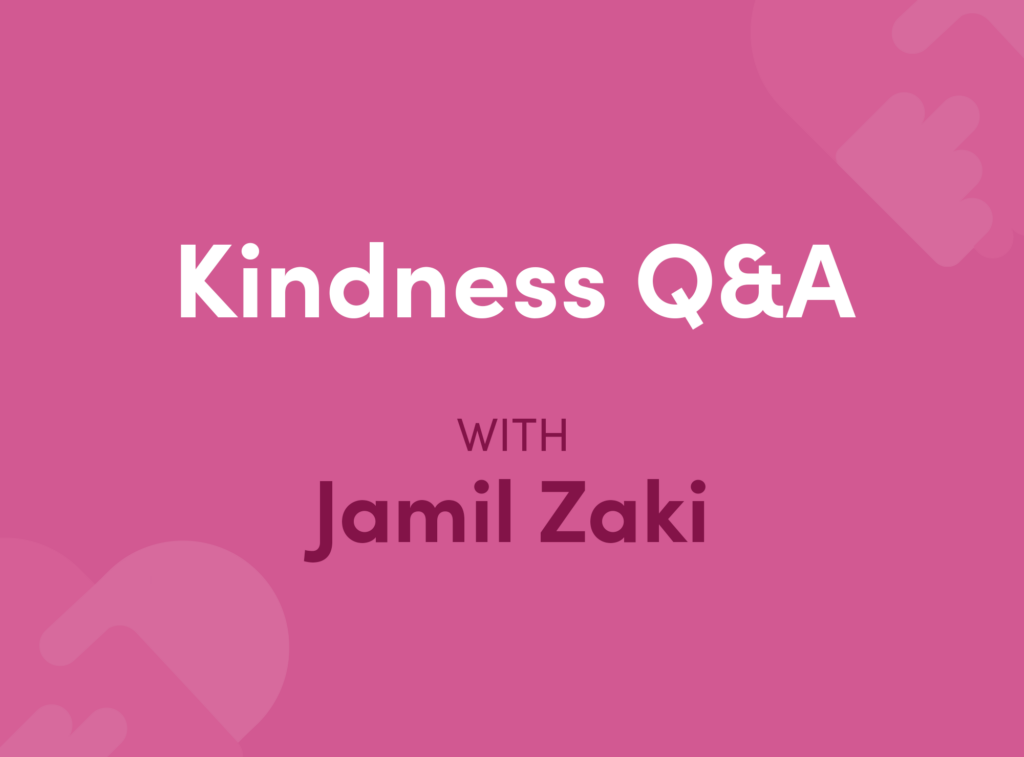
Jamil Zaki, an associate professor of psychology at Stanford University and the author of The War for Kindness, talked to us about what parents and teachers should know about kindness. Here are a few highlights:
What does it mean to be kind, and why is it so important?
Kindness is any action that you perform that’s not designed just to help yourself but to improve the well-being of somebody else. That can include acts of cooperation where two people mutually benefit, like working on a project together. It can also include altruism, where you help somebody else and don’t benefit yourself—for instance, donating to charity. Or, at an extreme, one soldier sacrificing their life for their comrades.
Why is it so important? I would say that human beings are not that impressive as a solo species. If we had to do everything alone, we simply would not have survived. What we do that’s special is work together, and cultures of collaboration and camaraderie are built on our willingness to show up for other people and to fulfill their needs, not just our own.
What do you think people get wrong about empathy and kindness?
A lot of people think that kindness is something you do for others that has to basically hurt you, that there’s no benefit to acting in a kind way. It’s almost as though people believe kindness is zero sum—in order to make somebody else happy, I need to sacrifice myself. The good news is that kindness is not zero sum. And when you give, you also tend to receive.
What’s the easiest thing parents and teachers can do to help kids practice empathy?
One thing adults can do is model behavior—it’s important to lead by example. I hear from parents who say that they encourage empathy in their kids. But then I ask them, how are you acting empathically in front of your kids? And they draw a blank.
Another important ingredient is what we reward kids for. Many people tell me that they think empathy is important, but then they praise kids mostly for their individual successes. We can focus instead on what kids are doing for each other. Ask kids at the end of the day not just how you did on that exam but what’s some way that you helped somebody today.
Your kid might point out that sometimes, people actually aren’t very nice. How should parents respond?
I definitely would believe a child who told me that somebody had been unkind to them. But I think it’s also important to ask, does that mean that my class overall is unkind? Does that mean the world is unkind? And they would probably say no.
It’s very easy for particular instances of unkind behaviors to live in our mind. We remember them vividly. But if they look around more carefully, I’ll bet there are a lot of people who value kindness quite a bit and are there to support them.
Sometimes, kids can be self-centered. Does that mean they lack empathy?
Not at all. Empathy is something that ebbs and flows with the situations you’re in. If you’re stressed, it can be hard to be empathic. If you feel lonely, it can be hard to be empathic. So the last thing that we want to do is have a lack of empathy for somebody who displays a lack of empathy.
You always want to look under the hood. If a kid acts in a way that doesn’t seem very empathic, what might be leading to that behavior? Oftentimes, we find that underneath what seems to be unempathic, even cruel, behavior is a lot of pain or uncertainty. Digging into that can uncover a whole bunch of empathy that wasn’t immediately apparent.
Is there something you’ve learned recently about empathy that surprised you?
I’ve learned just how much people underestimate each other. My colleagues and I have asked people at schools, at companies, in nationally representative samples, how empathic are you? And how empathic do you think most people are?
It turns out, there are two answers to that. The real answer and the real average in all of these communities is really high empathy. But the perceived average is low empathy. So we actually care a lot more about each other than we believe.
I wish that people knew that they’re underestimating the folks around them and that their communities are probably much kinder than they realize. If they did, it would open people up to being more vulnerable, more open with each other, and maybe feeling safe expressing their own empathy as well. Because it’s more common than they think.
